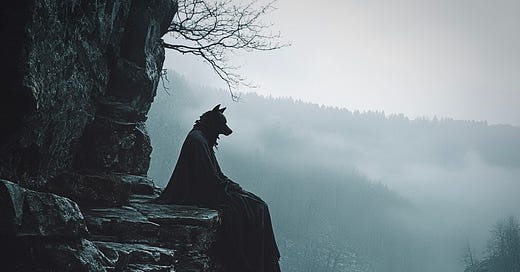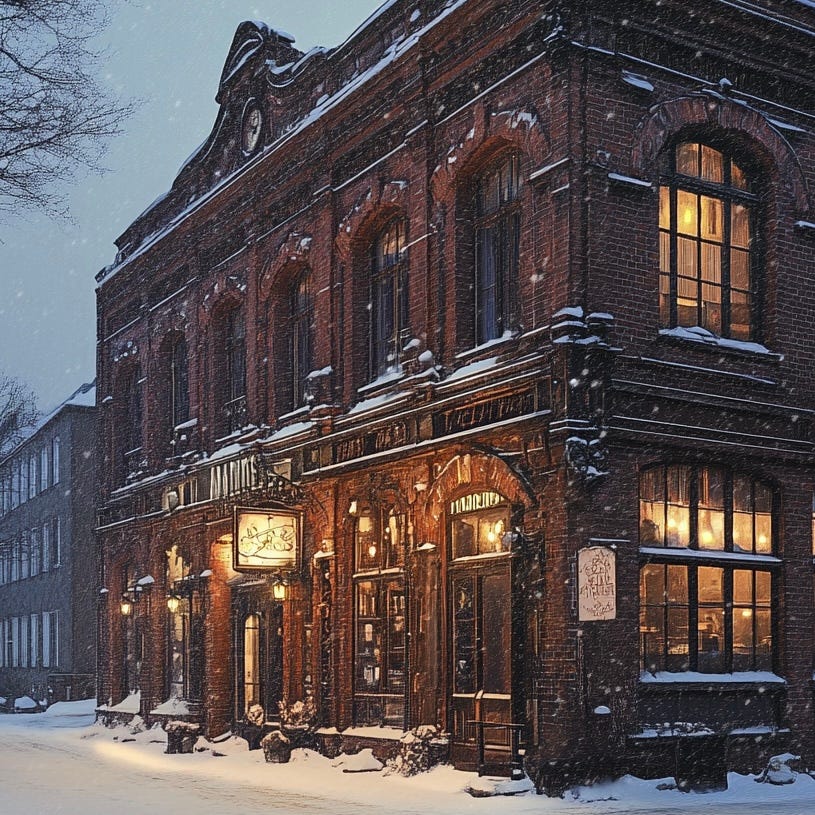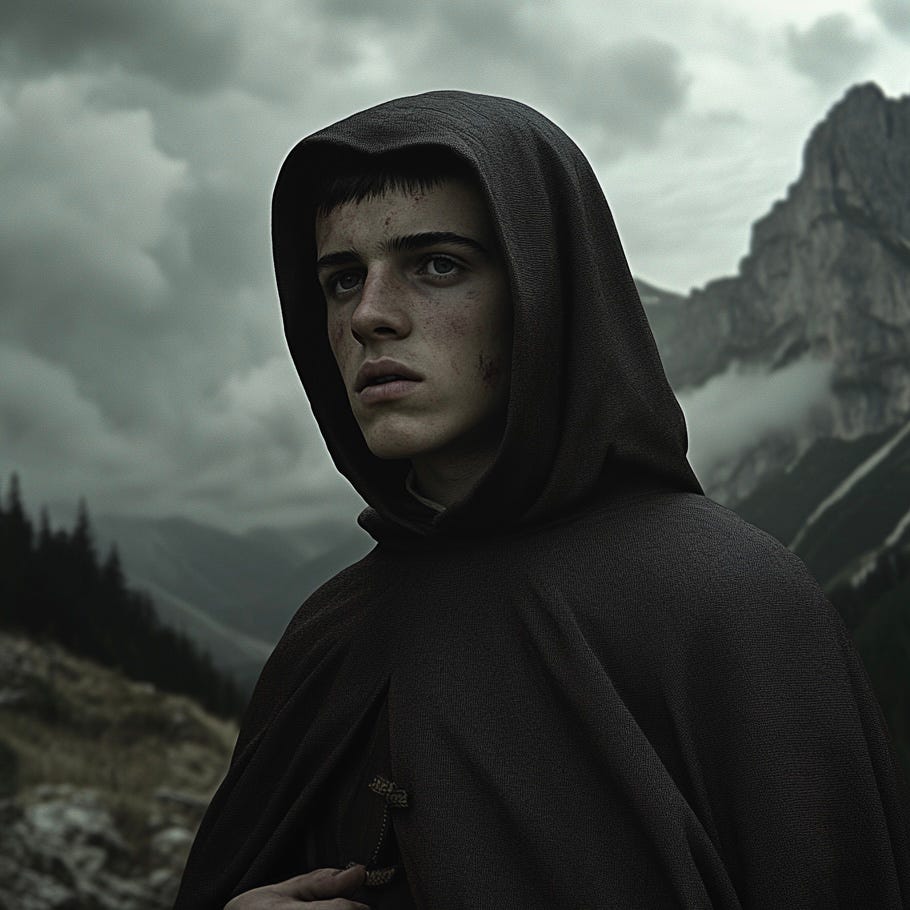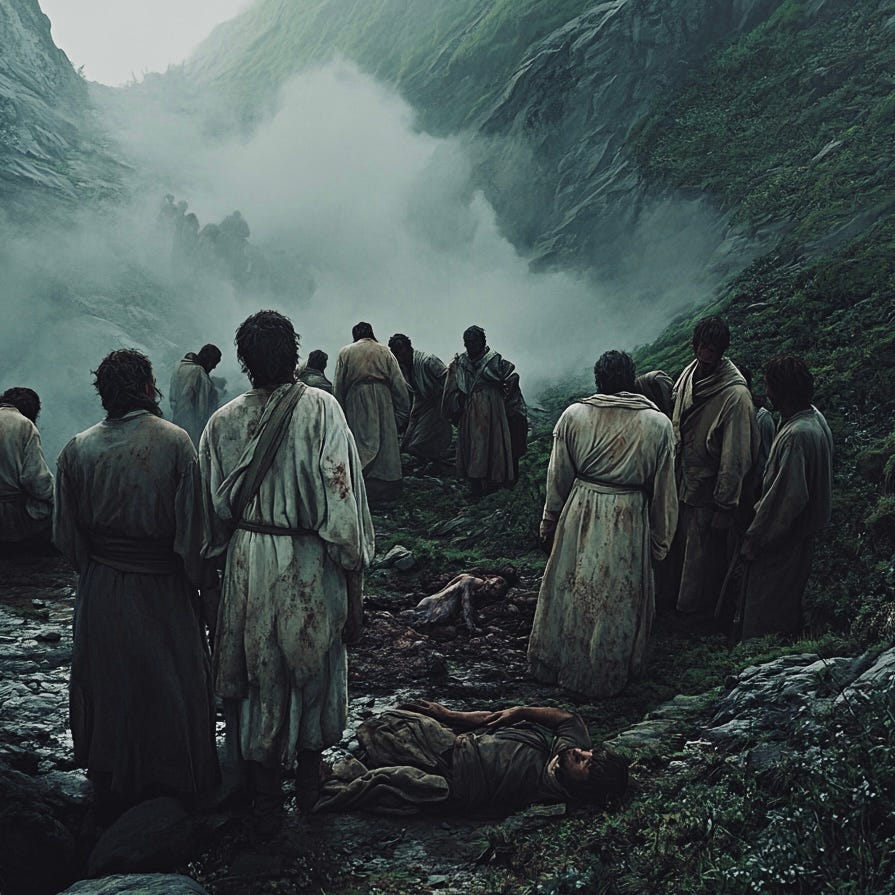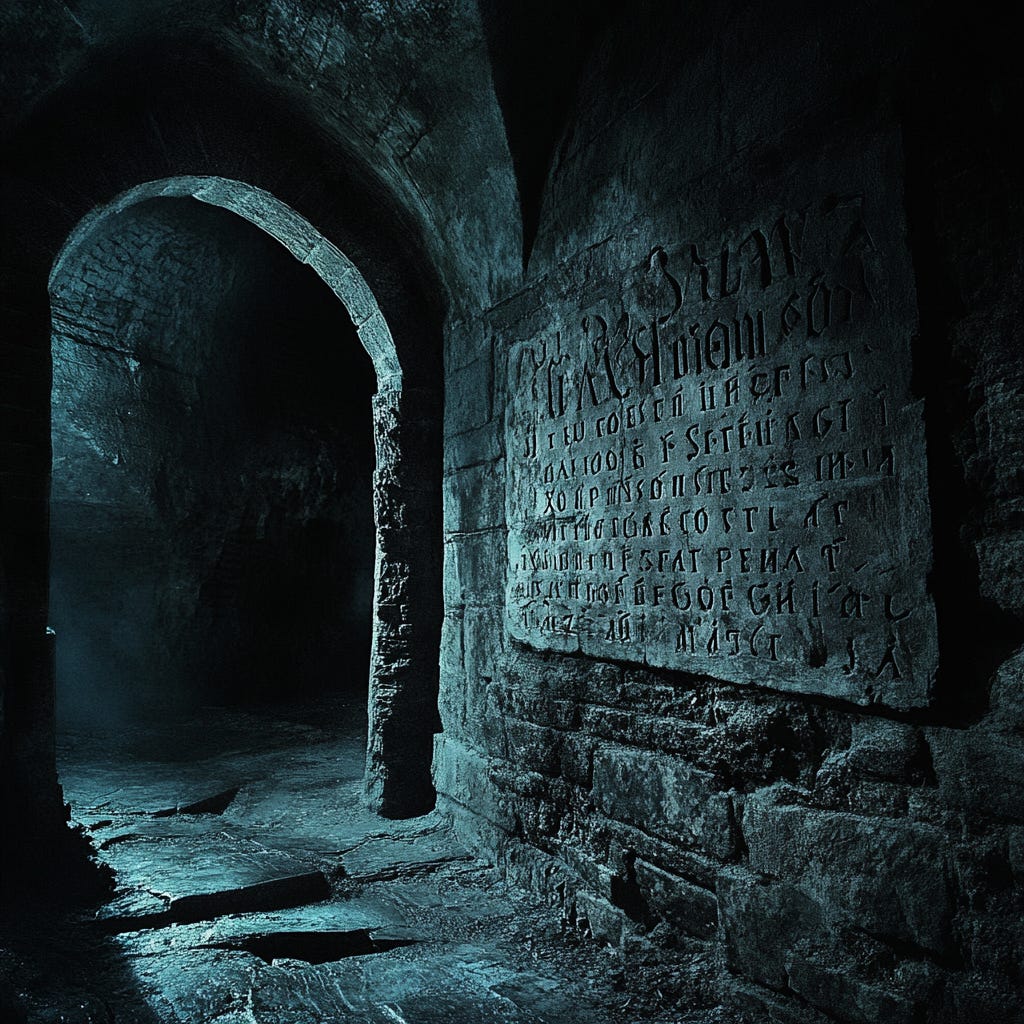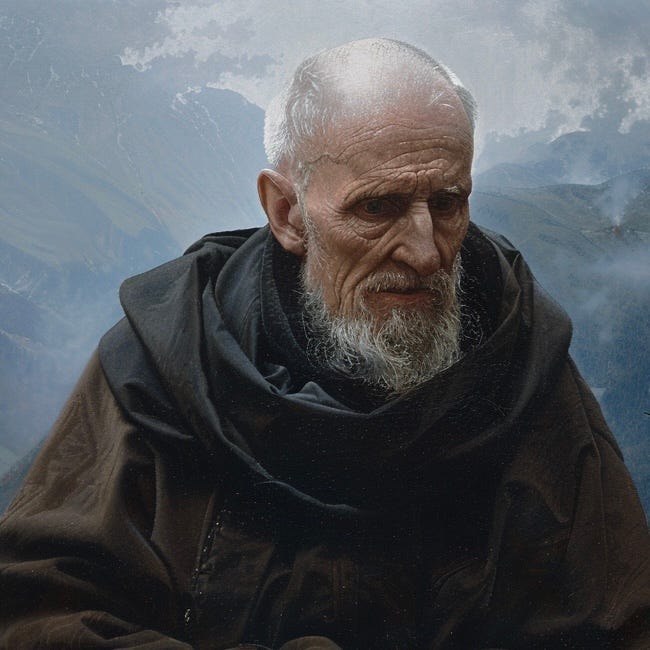Book II, Chapter 24: The Haunted Valley
List of Chapters | Previous Chapter
The most exclusive restaurant in Kohlendorf was Der Bahnhof (The Train Station), a fact that confused travelers passing through, since the two-story building housing it not only fronted the tracks but was crowned by a clock in an arch, like many other train stations in the Rhineland. But Der Bahnhof was over a quarter mile from the squalid platforms and coal-smudged ticket windows that constituted the only passenger station in the district.
Neither Hermann nor Benedikt had ever been in an eating house as opulent as the one they now found themselves in. It smelled of money, privilege, and Virginia tobacco. The echoing thud of their boots on the floor brought to mind the ghost tales of dead midshipmen stomping about the lower decks of doomed vessels. There were five round tables in a spacious dining room heated by an antique Kachelofen (ceramic stove), reputed to have once warmed a parlor in Sanssouci.
On an upraised platform, four rectangular tables were arrayed against the wainscoted walls. It was to one of these that Hermann and Benedikt were led. Above Hermann’s right shoulder hung a portrait of a scowling banker, who seemed just as perplexed by Hermann’s presence in this august establishment as he was. Outside, the February sun dropped down behind the town’s gabled rooftops, causing the already faded colors of the interior to grow more dull but concomitantly more respectable.
From the coffered ceiling of the main dining area hung a chandelier that had been lowered so the waiters could light the tapers. There was a well-lit banquet hall off to the side, where an adolescent in a double-breasted coat stood a-tiptoe on a stool, building a champagne tower for an event presumably to take place later that night.
The monocled patriarch of a captious-looking family summoned the Oberkellner (head waiter) to the table they occupied near the window. He complained that his wife found the presence of “the two laborers” offensive. To lend weight to papa’s argument, the children flounced their napkins and stole disapproving looks at Hermann and Benedikt.
Herr Ober snapped his fingers and the men at the chandelier abandoned their work to move a three-paneled partition from the door up the steps so that they could plant it in front of the two new arrivals and screen them from the other guests. “Much better!” the paterfamilias apostrophized.
Benedikt mumbled that he couldn’t agree more. “I don’t need an audience while eating. I’m starving and want to dive in with both hands.”
The Ober sheepishly peeped around the screen. His head was bald and beefy and perfectly proportioned to the barrel-round body that sustained it. His comical eyebrows shot up; and he shrugged his shoulders in silent disclamation of any responsibility for the monocled one’s sour behavior.
Benedikt handed him the voucher.
Herr Ober nodded. “I’d recognize that scrawl even if I had no eyes to see it with. Master o’ the house and whatnot. Mister Gold-Watch-On-A-Chain. ‘Do as I say’—et cetera, et cetera. But like you two, I was born and bred in the gutter. So I know what it’s like lookin’ up at them that look down on you.”
The man’s bizarre syntax and bumptious way of insinuating himself into their confidence made Benedikt shift in his seat.
“Landed this here job by the grace of God and a spot o’ dumb luck. But it wasn’t always easy. Well, enough about the ways of the world and the ways we go about surviving it. What’ll you two have? All free. Wine too.” He clapped his hands. “You can bacchanal it up into the early hours if you choose.”
Hermann spread his hands and helplessly look up at the Ober, unsure what to say.
“What do you have on offer?” Benedikt asked.
“What’s on offer is what’s on the menu. But the menu’s in French. And I can’t read it. Don’t know why it’s in French. Just fought ’em, you know? Bang! Pow! ‘Man the battlements!’ and all that.” He slapped Hermann’s shoulder. “I think this one wants steak. It’s called a fill-a-minion in Paris. You’d like the fill-a-minion, wouldn’t you?”
Hermann nodded.
“Yesss. Good cut o’ the cow, garnished with potatoes and other farinaceous things. Won’t ask if you want it rare. Who wants blood spurtin’ out o’ each chomp? But maybe you do.” He winked at Hermann. “Bit o’ the wolf in you, I think. Grrrr!”
The two men bobbed their head at each other and the Ober marched off.
He was planning to pull out all the stops and treat them like royalty, since he too was poor, and ergo no different from them. He was also itching to pull the leg of the monocled one (whom he didn’t really like) by intimating in a stage whisper that the two seemingly gentlemen behind the screen were, in fact, Prussian agents in disguise.
He would hint at heroic exploits at Sedan, and lament that he wished he could reveal more. “But I shouldn’t’ve said what I did. So pretend I didn’t, because it could not only hurt me for sayin’ but you for knowin’ what I shouldn’t’ve said and you shouldn’t’ve knowed.”
The boy raising Babel Tower in the banquet hall came to the table with two glasses in one hand and a bottle of Moselle (uncorked) in the other. He set the glasses down, grumbling, and poured the wine with one fist behind him in the small of his back (as Herr Ober had trained him to do). This done, he returned to his labors, amidst a cacophony of urgent and unsolicited advice.
Two hours passed. Having finished their meal (and a second bottle of wine), Hermann put his elbows on the table and interlaced his fingers. “It’s been a month since you told me about the funeral cortege and of the werewolf’s reanimation on the heights over Mariahilf. What happened next?”
The head waiter returned briefly to set a third bottle on the table with a wink.
Benedikt refilled his glass. “When the Romans saw the corpse come to life, like Lazarus from his bier, they fled en masse into the defile leading back to the Brenner Pass. At dawn, the men of Mariahilf, along with their square-jawed priest, climbed the slopes to investigate. Behind the curtained hearse they found Fr. Matteo lying unconscious. The corpse inside had withered away to dry bones.—”
“I know all this,” Hermann mumbled, flown with impatience and wine.
“Don’t rush me,” the ostler drawled. “The men hauled the wagon down into the valley to consult with the aldermen as to how to dispose of the Jesuit’s remains. You will recall that the Archbishop of Salzburg rejected Rome’s claim that the corpse belonged to Frater Melchior of Mariahilf, who, was rumored to have died near Wolfsberg in the Austrian province of Carinthia sometime during the reign of Maria Theresa.
“They resolved to bury the unholy relics of a man they believed to have been not only an imposter but a warlock in the blackened ditch that lies in the shadow of the hilltop chapel of Our Lady of Mercy. This would be where they would dump the corpse of the executed cannibal in 1848.—”
“It would also be where you and Father Reuss would bury the accursed medallion that came into the possession of my mother.”
A haggard expression clouded Benedikt’s features. “Indeed.” He was about to take another sip, but set the glass down, pushing it away by the base. “Fr. Matteo told me there was a stonemason among the villagers, a man in his fifties. He was a mute, and abided with his family in a small hut across from the steps of the Mariahilf Church.”
Hermann looked down at his trembling fingers. “That is where my grandfather Augustine built the cabin I grew up in.”
“The mute’s name was Caspar.” At the mention of the name, Hermann pushed his own glass away.
Benedikt nodded. “Melchior begat Caspar, who begat Augustine, who begat Moritz. . . .”
“Then the blood of the werewolf indeed flows through my veins.”
Benedikt rose from his chair and looked behind the screen to make sure no one was listening in. The restaurant’s other patron had long since departed, and for the moment the dining room was empty. The head waiter was in the banquet hall with the others, issuing directives. When Benedikt resumed his seat, he leaned across the table.
“The morning after the werewolf’s burial, a hunter sprinted into the village to report that a massacre had taken place on the heights where they had found the hearse. A score of men lay mangled and butchered at the mouth of the defile. By the condition of the corpses, the hunter believed they had been slain the previous night and dragged there. Fr. Matteo and the priest led the same men who had rescued him back up the rugged path. But this time the men came armed.
“My master said that he had never such carnage. He recognized the victims to be the men he had hired in Rome. Someone or something had pursued them into the defile and dragged them back to this place. The terrified men huddled close together, fervidly whispering in the wreathing mist. One man claimed that, when he had walked outside his hut to piss several hours before dawn, he had heard a wolf howling beneath the horned moon.
“But the priest silenced them, averring that the cause of the disaster was not a supernatural one. ‘This was the work of the godless banditti. They are obviously lying in ambuscade in the gorge. They have brought their victims here to exhibit their cruelty and warn us that it is they who control the high road to the Brenner Pass.’
“The men bundled up the disjected members and carried these down into the valley. A common grave was dug near the river, but was set well apart from Mariahilf’s cemetery, since the villagers would not suffer Italians to be laid to rest in consecrated ground reserved for pure-blooded Tyroleans.
“Mariahilf’s toll-master, as representative of His Majesty Emperor Francis II, decreed that all travelers passing through the village to the high road would be turned back until Innsbruck could be notified and an armed expeditionary force sent into the defile to clear it of any malefactors that might have established a den or hideout there.
“Fr. Matteo knew that he must leave. His guilt-ridden conscience had convinced him that it was he who he who was at fault for the evil that had befallen this peaceful community. His moral frailty and spiritual weakness had enabled the Devil seduce him and make him into his unwilling instrument. He hoped that by departing Mariahilf, the thing that he had brought there would depart with him. But he was wrong.
“He set out in a westward direction, cutting through the woods to wander along the Inn’s winding margins. He scaled the mountain in search of alpine fruits to supplement the salted pork the villagers had given to him upon his departure. Within hours, he stood high on the grassy slopes, absorbed in solitary prayer as he plucked blueberries from the bushes clinging to the lichened rocks.
Suddenly, he heard what sounded like the low growl of a wolf.
“He saw a man sitting removed at a distance, contemplating the river below. The man wore the cloak and a shaggy mask of a mummer. But the mask’s pointed ears twitched. And when he turned around, Fr. Matteo saw a wolf’s muzzle; and the jaws were slavering. But it seemed from that vantage even more artificial. For a pair of bloodshot eyes stared from the hollows of two holes cut out of the mask’s material, and he could see a pair of human lips gibbering deep inside the propped-open maul.
“He could not bring himself to address the entity. He knew it was the demon. It had followed him out of the Mariahilf and up into the mountain. Fr. Matteo made his peace with God, suspecting that at any moment he would share grisly fate of the slain retainers. But in his pride, he turned his back on the creature, and, calmly, descended the same unfrequented path up which he had come.
“When he had made it to back down to the river Inn, he spun round and scanned the slopes. But there was no movement among the sparse vegetation. Aggrieved, he walked along the river until he was forced to step into its green waters to skirt the tumbled screes. It was then that he espied that hermit’s cell that crouches on the mossy perch over the river, a structure built long ago at the mouth of that small tunnel leading into the bowels of the mountain.
“‘Hurry!’ a young man cried from inside. The timbre and tone of the voice resembled Matteo’s. ‘Something has been following you. I’ve been watching it from here. It’s getting closer to you.’
“Matteo clambered up the slippery acclivity. When reached the top, he entered the dank closed space. There was no one there. No one alive, that is. A man had tried crawling out of the tunnel, but had been dragged back in and lay prone, half inside its mouth. The corpse’s fingernails had dug trenches into the wood floor. The corpse was clad in the habit of a Franciscan.
“When Fr. Matteo tilted the head back, he fainted straight away. For the face was his own.
“He heard the sound of metal clinking against stone. And when he opened his eyes, he saw above him one of the rusty iron rings through which the rope way had run was stirring in the wind, for he had been translated bodily to the second of the three discontinuous projections that run along the western face of the mountain, opposite Mariahilf’s valley.
“He knew this—as if by instinct, because the werewolf had told him the story of Melchior, the stonemason’s son, and of Melchior’s beloved Élise. At an elevation that would have been impossible for Fr. Matteo to jump to, he saw the same apparition that he had encountered on the mountain only a few hours before ‘What are you?’ he asked, breathlessly.
“But the creature gave no answer. ‘If this is my punishment, I shall face it with equanimity. Because I know that I have been damned and hurled into the gulf of despair, I now suffer no fear.’ Again, he turned his back on the demon and faced the third and most treacherous leap. Not only was it the narrowest ledge, but it followed a downward slope before reaching an abrupt drop.
“‘The Lord is my shepherd. I shall not want!’ He ran, he leapt, he alighted on the shelf. But he could not slow down, so he flung his right hand out, seizing a chain he knew would be there on the sharp corner where the ledge is no broader than the span of a man’s arm.
“By the time he walked the winding path leading up into the painted Waldensian caves, all anxiety and fear had been purged from his heart forever. He refused to look behind him. ‘You are an outcast of Heaven. You lie beneath the throne of God. Abject as I am, I stand far above you. Were I clad in shoes, you would not even be worthy of unloosing their latchets.’
“When Matteo recalled how, in his folly, he had let himself be spiritually and carnally defiled by the Beast, he sobbed and beat his breast. During those long and half-forgotten nights, when he and the werewolf had engaged in mental (and what he now believed to have been physical) intercourse in that candlelit dungeon far beneath the catacombs of Santa Maria della Concerzione dei Cappucini in Rome, Satan had injected into the young man’s ravaged brain a seminal vision of the Waldensian hideaway, a vision whose seed would incubate into an embryonic map (internalized in the womb of the young man’s mind)—a map of veiny labyrinthine corridors, a map that would come to term in form of a wicked homunculus that would lodge itself in the poor man’s pineal gland.
“Matteo now recognized each mural, as if he had painted it himself. He strode boldly through the interlocking chambers, knowing where every pitfall and obstruction lay. He passed through the columbarium from which the doves had flown (never to return again) on the night Théophile was murdered. He emerged from the archway onto the promenade that ran between the cliffs and those vacant dwellings of the long-dead chieftains of that isolated community.
“When he found the chamber with the Latin inscription warning those who undertook the journey into the mountain that they dare not kindle a light or else they would die, he did not hesitate for a moment, but rather plunged into the cold womb of Mother Earth. Though he did not have enough rations to sustain him, he somehow survived the two-week journey, and crawled out of the tunnel; and back into that hermit’s cell where the nightmare had begun.
“There were still claw marks on the floorboards where the ghost of his former self had died. And he would resort to that cell many, many times over the course of the many decades that followed. When I met him, he was nearing the end of his life. But he said that he could not leave the world until he had passed on to me the harrowing tale of the werewolf of Mariahilf am Inn.”
Hermann and Benedikt were startled by a sudden commotion at the entrance of the restaurant. A score of uniformed officers were stepping in from the fresh falling snow. The Ober welcomed them and guided them to the banquet hall, addressing the guest of honor as Colonel Ludwig Landecker.
That was all the two needed. They rose from the table and, from behind the three-paneled partition, monitored the party’s withdrawal into the banquet hall. Amid the convivial laughter, no one noticed them hastening to the door. Without so much as saying farewell, or thanking the Ober for the lavish feast, they plucked their coats off the hooks and stepped outside.
As they crossed the street to the hotel, Hermann, who had remained silent throughout much of Benedikt’s narrative, offered up his own commentary on what it meant to him.
“When I was a boy, my father took me on his knee and explained the symbolism behind the memento mori he had carved: a frail hermit holding open a flap of his flesh to reveal carrion worms devouring him from within. Papa told me the explicit meaning of it was to remind us that we all must die. But that its implicit meaning was that, even though we walk the earth by the grace of God, we are already dead.”
“Do you realize that what your father taught you is not a view sanctioned by the Church?”
Hermann thrust his chin into his coat, ignoring the remark. “I believe that Fr. Matteo di Pàdova, whom I once despised but for whom I now feel a grudging respect, was presented with a memento mori in the form of that apparition of himself lying on the floor of the cell. His nightmare did not begin there, as you said. It had been playing out all along.”
Benedikt held open the outer door of the Rheingold Hotel. Hermann stepped inside. “By the time you met you met your master,” he said, sullenly, “he was already dead. He was as dead as my mother and father are; as dead as my children and my sweet wife. He was as dead as you and I are now.”

